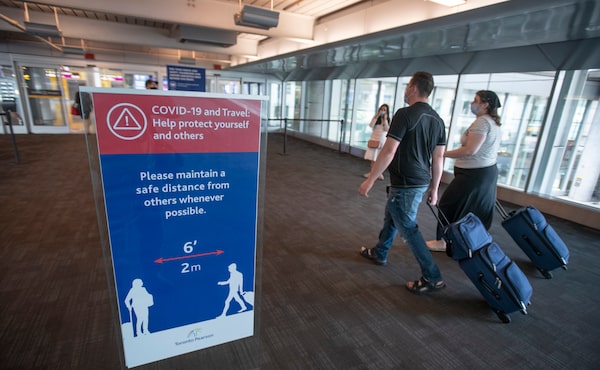
Travellers walking to Terminal 1 at Toronto Pearson International Airport on July 14, 2020.Fred Lum/The Globe and Mail
The federal government is facing calls to bolster measures at airports as other countries are doing, including medical screening for arrivals, to help prevent the further spread of COVID-19.
Currently, every person who enters Canada is required to answer a series of questions on their medical condition and to quarantine themselves for a 14-day period that begins on the day they arrive in the country. They are also required to wear a face covering while they are entering Canada and while they are in transit, unless they are alone in a private vehicle.
But other countries have adopted more stringent measures. In Taiwan, for example, a medical health check is in place at airports before immigration clearance and quarantine vehicles are provided to prevent arrivals from taking public transportation. Critics say Canada should be exploring such measures and quickly.
Scott Simon, a professor and co-chair of Taiwan Studies at the University of Ottawa who recently travelled back to Canada from the country, says the severity of COVID-19 requires Canada to take urgent measures.
He said both Canada and Taiwan require a 14-day quarantine for all incoming passengers, but there are big differences in how this is implemented. For example, arriving travellers are not permitted to take any form of public transportation in Taiwan while heading to quarantine.
After the 2003 SARS crisis, he said, that country instituted its health screening station at airports before travellers go through immigration. It includes a temperature screening checkpoint and a disinfectant carpet designed to remove potential viruses from shoes.
The Public Health Agency of Canada confirmed Wednesday it is increasing the number of public health officials at 36 high-volume points of entry, including air and land, that receive 90 per cent of incoming travellers. It did not specify what their mandate will include.
Wesley Lesosky, the president of the union representing roughly 10,000 Air Canada flight attendants, said Wednesday there should be more safety precautions to ensure the health of inbound passengers upon arrival.
An instructional handout on self-monitoring and quarantine requirements for passengers is not enough, he added.
“I think there should be more,” he said. “Whether it be a health check where you have to advise if you have flu-like symptoms, or temperature screening on arrival, as opposed to a piece of paper at customs.”
Ottawa is eyeing changes, Transport Minister Marc Garneau told The Globe and Mail in a statement, adding that Canada knows the air travel experience will not be the same in the time of COVID-19.
He pointed to how the Sept. 11, 2001, terrorist attacks significantly changed air travel and how the pandemic has highlighted the need to evolve as well.
“Like many countries around the world, Canada is assessing what long-term changes are needed to enhance the air travel journey to continue to protect the health and safety of the travelling public,” he said.
Jean-Pierre Fortin, the national president of the Customs and Immigration Union, a component of the Public Service Alliance of Canada that represents front-line customs and immigration workers, said Wednesday that the union has been pushing to have more public health officials at the airport.
Border agents do not have a medical background to effectively scrutinize those who may have contracted the virus particularly with the volume of travellers coming into airports, he said, adding that 192 public health officials are being hired for 36 locations.
“It would have been better had they been hired at an early stage of the pandemic,” Mr. Fortin said. “But as we say, ‘better late than never.‘”
Conservative transport critic Todd Doherty said Wednesday that Canadians deserve to know the full details of any new airport screening measures and how exactly they will be enforced.
Conservatives were calling for enhanced screening measures at airports as early as January, he said, adding the government ignored their questions and played down the threat of the virus.
NDP transport critic Niki Ashton also urged the government on Wednesday to bolster airport screening to ensure people are kept safe.
All air operators are currently required to conduct temperature screenings of all passengers travelling to Canada prior to departure.
Temperature screening stations will be placed in the departure section of the four major airports identified as the only Canadian airports for international travel at the end of July.
By September, temperature screening stations are to be placed in the departure sections of the next 11 busiest airports in Canada including Quebec City, Ottawa and Toronto’s island airport.
Canadian airports are taking direction on their COVID-19 precautions from the federal government, but some airports and individual airlines are also creating their own guidelines.
Tori Gass, spokesperson from the Greater Toronto Airports Authority, said the industry has worked closely with the federal government on best practices for dealing with COVID-19.
Several airlines including Air Canada and WestJet are already performing temperature checks on their outbound passengers, she added.
Isaac Bogoch, an infectious diseases specialist at Toronto General Hospital, said that airports have taken “reasonable steps” to ensure passenger safety, but added that passengers must take into account physical distancing at every step of their journey.
Know what is happening in the halls of power with the day’s top political headlines and commentary as selected by Globe editors (subscribers only). Sign up today.
 Kristy Kirkup
Kristy Kirkup